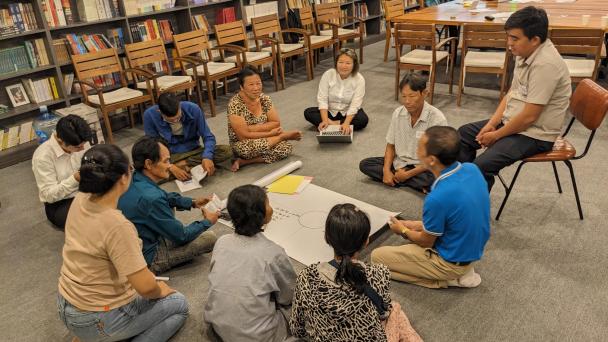Co-constructing climate-health knowledge with informal outdoor workers in urban Vietnam


In October 2024, Rebecca Light became one of the recipients of the Survey Futures Early Career Impact Awards. She previously worked at the National Centre for Social Research (NatCen) in the Health and Biomedical Surveys team and is currently on secondment at University College London (UCL) where she is working with data from the National Study of Sexual Attitudes and Lifestyles (Natsal) to contribute to initial analysis towards the methods and paper outputs. This blog reflects the work she has been involved in with Natsal as it pivoted its data collection post-pandemic.
The National Study of Sexual Attitudes and Lifestyles (Natsal) is a cross-sectional study currently in its fourth round of data collection. The first round was in 1990 as a response to the HIV/AIDS epidemic and, since then, it has been crucial to our understanding of sexual behaviour, STI/HPV screening programmes and attitudes towards relationships.
In Natsal-4, data collection was conducted in England, Scotland and Wales within the general population aged 16 to 59. The full interview was around an hour-long covering topics such as sexual experiences and practices, sexual violence, digital technology, reproductive health, accessing sexual health services and attitudes around sex and relationships.
All the previous three Natsals have used the postcode address file (PAF) to sample participants. Natsal-1 was a paper questionnaire administered face-to-face whilst Natsal-2 and Natsal-3 were an interviewer conducted face-to-face interview. In addition, a biological sample element was included in Natsal-2 and Natsal-3 which involved obtaining consent for a saliva or urine biological sample. In Natsal-4 participants were asked if they would provide a vaginal or urine biological sample depending on sex and gender. Natsal-4 was due to start fieldwork in 2020 using the same methodology and data collection procedure as Natsal-2 and Natsal-3. However, as experienced by many studies, this was halted due to the COVID-19 pandemic.
Natsal-4 was adapted post-COVID to a mixed-mode approach of face-to-face and remote telephone interviewing. This allowed us the flexibility with the ever-changing pandemic landscape and to encourage and improve participation with a remote telephone method, given participants’ and interviewers’ COVID-19 concerns. Natsal-4 included a biological sample, consent to data linkage and sensitive topics asked through a large self-completion section. The remote telephone method involved the development of an online self-completion, including programme design elements for sensitive questions, electronic consent to the biological sample and data linkage, as well as adapting protocols to maximise response and return of biological samples.
However, our original data collection plan of face-to-face and remote telephone interviews using the PAF as a sampling frame was not yielding the target number of interviews we had planned. This was due to the decline in response rates since the pandemic and the impact of COVID-19 on the interviewer field force experienced across the survey industry.
To combat this, we explored the potential of using the NatCen Opinion Panel to recruit participants. This is a probability panel, managed by the National Centre for Social Research (NatCen), comprised of people who took part and consented to follow up research in the British Social Attitudes survey. This was the first time a large address-based probability study had moved to a probability panel sample, where the members were more used to online short questionnaires.
The questionnaire for the NatCen Opinion Panel was an adapted but similar telephone interview to what was used in the PAF. Protocols for participation and the biological samples were adapted to implement a bespoke reminder strategy and our logistics team posted out biological samples as we had no interviewer present or able to visit.
We decided to accompany the NatCen Opinion Panel telephone questionnaire with a web follow-up for participants who had not taken part in the telephone interview. This used similar protocols for participation and biological samples as the telephone interview, but we created a shortened questionnaire, which aligns more with the length of typical panel studies, and an adapted programme to capture the essential Natsal data.
The use of the NatCen Opinion Panel seemed to be successful in terms of the logistics of setting the study up and rolling it out. It was also successful in terms of the productive response in both the telephone and the web follow up. We found the consent and return of the biological sample and data linkage was good which was promising as this group of participants had not been introduced to this element in previous panel studies.
Natsal-4 finished data collection in January 2024 and there has been a lot of work put into cleaning, sorting and bringing the data from the three different surveys together. In addition to the data collection at NatCen, Ipsos have also collected data through online non-probability panels. Work has begun to synthesize the mixed mode and method data together to analyse and interpret our findings for publication later this year.
Receive a regular update, sent directly to your inbox, with a summary of our current events, research, blogs and comment.
Subscribe